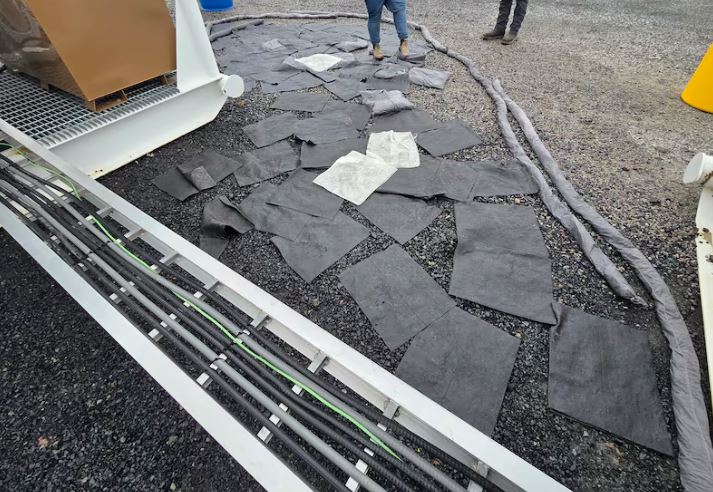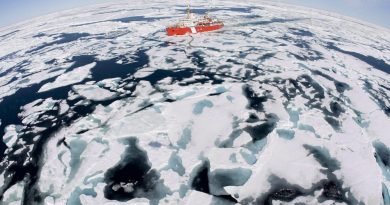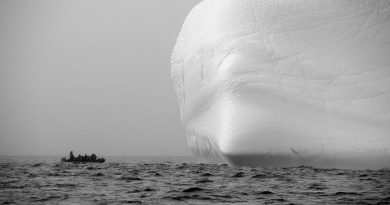7,000L fuel spill in Yellowknife could have been prevented, truck driver says

Kelly Stabenow still remembers when 7,000 litres of furnace fuel seeped into the ground in Yellowknife’s Engle Business District near Deh Cho Blvd last month. He was the one delivering the fuel.
It was just like somebody had a bathtub running, he said. Once I realized what it was, then that’s when panic set in.
The spill in the early hours of Oct. 16 happened at a site leased by Enerchem, an Alberta-based company, and operated locally by Polar Fuels.
It’s the largest recorded petroleum overflow spill in Yellowknife since 2004, excluding spills of unknown amounts, according to a database kept by the N.W.T.’s Department of Environment and Climate Change (ECC).
Stabenow lives in Alberta and worked for an Alberta-based fluid hauling company contracted by Enerchem to bring furnace fuel up to Yellowknife.
He said he lost his job as a result of the spill after more than two decades hauling oil, fuel and water without a spill to his name until now.

How it unfolded in his eyes
Stabenow said he had been instructed by a Polar Fuels worker to unload the fuel into a specific tank when he reached the site.
After he started unloading shortly after midnight, Stabenow said he was doing a a routine check of his truck when he heard the tank overflowing and ran to the pump to reverse it.
A check valve in the load line prevented the fuel from being sucked back. Stabenow said he had to wait until the fluid pressure started to release in the tank for it to stop overflowing.
I couldn’t do much about it except watch it leak out of the tank until it was done,” he said. “To watch a tank overflow, that’s a nightmare for a fluid hauler.

Stabenow said the Polar Fuels worker who had told him where to unload came to the site and helped him put soaker pads on the ground to absorb some of the spill, but to little avail.
What ended up happening was, the fluid dissipated, just sunk into the ground, he said. Before it was daylight out, it was already into the ground.
If there had been a liner in the ground under the tank, Stabenow said he could have just sucked the fluid from the liner. Instead, the contaminated soil and gravel had to be excavated.
He also said the tank he was asked to transfer the fuel into didn’t have capacity for his fuel delivery.

Stabenow said he is used to being able to check how much fuel is in a tank before unloading into it, using a gauge. This tank had no gauge, and he was told that drivers should not measure the tank through a process called dipping because of safety reasons.
Dipping is a way to measure how much fuel is in a tank if it does not have a gauge by dipping a stick into it. That would show the height of the fuel level, but not the volume.
Instead, he said Polar Fuels would dip the tanks themselves, and let drivers know where to unload. But even if he had used the dipping method, Stabenow said there were no conversion charts to help him translate the fuel level to volume.
Stabenow said he had never delivered fuel in the Northwest Territories before he started hauling it to the Enerchem location in Yellowknife, so he was not aware of what was required of fuel unloading sites in the territory.
He said there are often spill prevention measures elsewhere which can include a loud alarm and a flashing light alert once a tank reaches a certain capacity.
Stabenow said he did not see or hear that.
CBC News reached out to Polar Fuels for an interview to confirm Stabenow’s account, and was directed to Enerchem.
AltaGas, Enerchem’s Alberta-based parent company, did not respond directly to a detailed list of questions sent by CBC after declining an interview.
As soon as the release was discovered, the contractor ceased operations and quickly activated the emergency response protocols to contain and clean up the furnace fuel, a media relations spokesperson said in a statement.
AltaGas also confirmed an investigation is still underway to determine the cause of the spill and future steps to prevent similar incidents.
Remediation is ongoing
Both ECC and AltaGas have confirmed that the remediation at the site is ongoing.
In its statement, AltaGas said it has removed the fuel, affected gravel and soil and transported it offside to an approved facility. According to the company, this involved excavating an area of approximately 80 by 40 metres, and up to two metres in depth.
The company wrote that it has tested the soil and surface water, and that groundwater monitoring is also happening.
ECC declined an interview, but in an email, a spokesperson said ECC officers and personnel have been attending the site regularly to monitor the cleanup and remediation.
The department confirmed that it is within its powers to issue penalties or lay charges for violations if the situation warrants it, but its current focus with this spill is to make sure it is cleaned up appropriately.
KBL Environmental Ltd., a firm involved in the clean up at the site, declined to comment.
ECC does not have a timeline yet for when it expects to conclude its investigation into what caused the tank overflow.

The issue of compliance
Craig Halifax, the N.W.T. Fire Marshall, said that spill prevention and containment requirements are specific to each individual site, and it takes someone with expertise in a particular section of the National Fire Code to interpret what requirements apply.
He confirmed that the Office of the Fire Marshall has the authority to inspect bulk fuel storage sites for compliance with the code, but does not do so as a practice because their inspectors are typically trained for more basic applications of the fire code.
He said that’s because building safety is the key priority for his office, rather than systems and equipment.
He said a bulk fuel storage site in Yellowknife would require a permit from the City, which did not provide a response by deadline.
Stabenow has not been able to find another job since he was let go in late October.
He said he intends on filing a civil lawsuit for wrongful termination once he finds legal representation.
I got a wife and two kids to look after, he said. It was a great job, good money.
He said prospective employers may be deterred from hiring him because he was fired for the spill, even if he tried to explain the situation.
Chances of taking me on are pretty slim right now, he said.
CBC News has viewed photos of documents provided by Stabenow that show he passed drug and alcohol testing on the morning of the spill.
Capital Logistics, Stabenow’s former employer, declined to comment on the reason for his termination.
Related stories from around the North:
Canada: Cyanide detected in creek after Victoria Gold’s heap leach failure at Eagle gold mine, CBC News
United States: ConocoPhillips will pay Alaska $312,000 after North Slope oil, Alaska Dispatch
Russia: Oil company tried to cover up large Arctic oil spill, The Independent Barents Observer



